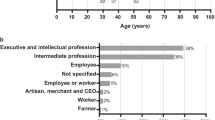Abstract
Dor Yeshorim, a genetic testing programme focusing on the ‘genetic compatibility’ of prospective couples in Orthodox Jewish communities in Europe, the US and Israel, is at the centre of our paper. We discuss the specific understandings of risks that enable the effective implementation of the Dor Yeshorim model in Orthodox populations. Furthermore, we compare Dor Yeshorim to the premarital genetic testing programme for thalassaemia in Cyprus and analyse the particular social practices which generate different notions of genetic identity in these two projects. In the Cypriot programme, where individual carrier status is disclosed, unfavourable genetic carrier status is conceptualized on the individual level and often solved by resorting to prenatal genetic diagnosis upon pregnancy. In the case of Dor Yeshorim, where no information on carrier status but only on the ‘genetic compatibility’ of both partners is revealed, a notion of ‘genetic couplehood’ arises which conceptualizes ‘genetic risk’ not individually but as a matter of genetic jointness. If a prospective couple is found out to be ‘genetically incompatible’, marriage plans usually are cancelled. Furthermore, by not disclosing individual carrier information, Dor Yeshorim successfully avoids a pressing issue which ‘secular’ genetic testing programmes struggle with: the peril of ‘knowing too much’.
Similar content being viewed by others
Author information
Authors and Affiliations
Corresponding author
Additional information
aBarbara Prainsack is a lecturer researcher at the Department of Political Science at the University of Vienna, Austria. Her doctoral thesis on the regulation of embryonic stem cell research and human cloning in Israel won the Best Political Science Dissertation 2003/04 award of the Austrian Political Science Association. In 2002, she was a visiting doctoral student at the Department of Social and Behavioral Sciences at the University of California, San Francisco. Prainsack teaches courses in comparative politics and biotechnology regulation in Austria, Israel and Thailand; her current research focuses on the analysis of regulatory policies in the field of biobanks and genomics.
bGil Siegal is health law professor at the schools of law at Bar Ilan and Hebrew Universities, and Ono College, Israel. In addition, Dr Siegal serves as a Member of the National (‘Helsinki’) Committee for Genetic Research in Humans, authorizing all genetic research involving humans in Israel, and is a Member of the National Advisory Committee on Genetic Information. His areas of expertise and focus are on biotechnology, patient rights and comparative medical ethics. He received his medical and law degrees from Tel Aviv University, Israel, and completed an otolaryngology residency at Bnai Zion Medical Center, Haifa, Israel. In 2003, he was a fellow in health policy and ethics at the Law School and the Institute for Practical Ethics, University of Virginia, USA, where he teaches a course on comparative health law. In 2004 he was a research fellow at Harvard University Medical School, Boston.
Rights and permissions
About this article
Cite this article
Prainsack, B., Siegal, G. The Rise of Genetic Couplehood? A Comparative View of Premarital Genetic Testing. BioSocieties 1, 17–36 (2006). https://doi.org/10.1017/S1745855205050106
Published:
Issue Date:
DOI: https://doi.org/10.1017/S1745855205050106




